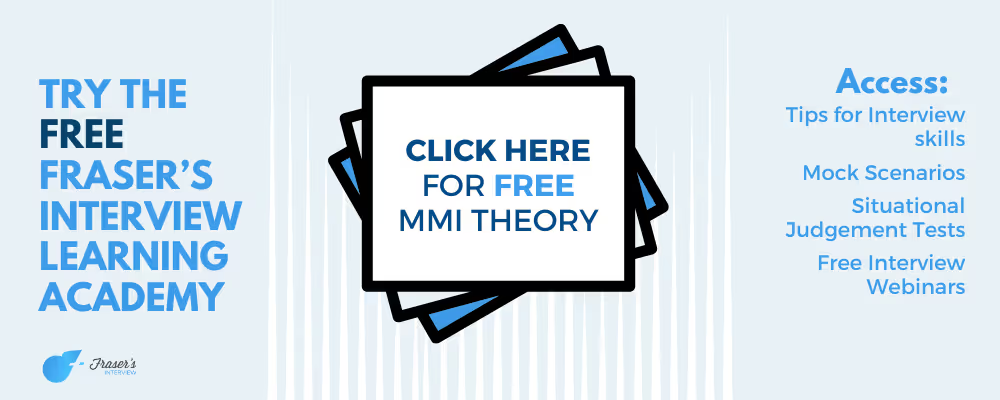Wondering what to say in your undergraduate medical school interview?
You’re not alone. Every year, thousands of students prepare for the challenging and high-stakes undergraduate medical interview. From understanding medical ethics to handling scenario-based questions about public health, your ability to communicate with empathy and logic determines your success.
This article highlights the most common undergraduate medical interview questions, how to approach them, and what admissions panels look for.
Why Do You Want to Be a Doctor?
This is one of the most iconic medical school interview questions, and for good reason. Universities use it to understand your motivation for studying medicine, your awareness of the profession, and the personal qualities you bring that align with medical values.
Considering that you’re a Year 12 student with little to no hospital experience, you should focus on what inspired your interest in medicine. And highlight the personal values and qualities that make you a strong fit for medicine.
When answering, include high school extracurriculars that helped develop empathy or leadership, volunteer work that exposed you to service, or science studies that sparked curiosity. Connect these experiences to the qualities of a good doctor and reflect on how they’ve shaped your desire to pursue medicine.
Aim for a response that sounds genuine and self-reflective rather than rehearsed, showing both why medicine matters to you and how you hope to grow within the profession.
How to Answer Medical Interview Ethics Questions
Ethics are central to every doctor’s professional life, and form a key part of both MMI and panel interviews.
You’re not expected to be an ethics expert, but you should demonstrate logical reasoning, empathy, and an ability to consider different perspectives. A strong approach is to structure your responses around the Four Pillars of Medical Ethics:
- Autonomy: Respecting patient choices
- Beneficence: Acting with the patient’s best interest
- Non-maleficence: “Do no harm”
- Justice: Treating all patients fairly
Example Ethical Scenario
A 10-year-old cancer patient asks to know her diagnosis, but her parents request the doctor not to tell her. What should the doctor do?
Here, you’d weigh autonomy (the child’s right to know) against non-maleficence (avoiding psychological harm) and explain your reasoning calmly and empathetically.
Common Ethics Questions
- What would you do if your colleague made a mistake with a patient?
- Should vaccination be mandatory in Australia?
- How would you balance patient confidentiality with public safety?
Tip: Show that you can see both sides of the ethical dilemma before explaining where you stand.

Public Health Questions in Undergraduate Medical Interviews
Public health awareness is vital for modern doctors. Many interview stations explore your understanding of Australia’s health challenges.
Before your interview, familiarise yourself with:
- Major chronic health issues (eg: diabetes, obesity, asthma, mental health)
- National health programs like the NDIS (National Disability Insurance Scheme)
- Ongoing public health campaigns and preventive strategies
Common Public Health Questions
- What are some effective public health campaigns in Australia?
- Should mental health patients receive paid leave at work?
- How would you improve community health literacy?
Tip: Use your answer to show empathy, clear communication, and social responsibility — exactly what admissions teams want to see in future doctors.
General Knowledge Questions About Medicine
Interviewers often ask broad, open-ended questions to see how you think, not just what you know. These questions are designed to gauge your curiosity, your engagement with medicine as a constantly evolving field, and your willingness to look beyond textbooks and exam content.
You don’t need to know every breakthrough, but you should be able to:
- Keep up with health-related news and emerging medical advancements
- Show awareness of major health challenges facing Australia
- Discuss both the strengths and limitations of modern medicine
Common Medicine-Related Questions
- What is the biggest health issue facing Australia today?
- What recent medical advancement interests you most?
- What aspects of being a doctor do you think are most challenging?
Tip: Highlight curiosity and a commitment to lifelong learning, these are qualities every medical professional needs!
Rural and Indigenous Health Questions
Rural health is a recurring topic in Australian medical interviews because it touches on equity, access to care, and the unique challenges faced by communities outside major cities. Interviewers want to see that you understand the disparities in healthcare availability, the impact on patient outcomes, and the importance of delivering quality care to all Australians, no matter where they live.
Expect questions around:
- Aboriginal and Torres Strait Islander health outcomes
- Barriers to healthcare in rural communities
- Initiatives like the Bonded Medical Program (BMP) and Commonwealth Supported Place (CSP)
Tip: Demonstrating awareness of these issues shows not only your knowledge of the healthcare system but also your empathy and commitment to serving diverse populations!
Getting into medicine is a highly competitive journey, but thorough preparation can make all the difference. At Fraser’s Interview, we support students in preparing for both MMI and panel interview formats through expert-guided training, practical exercises, and personalised feedback.
You can explore our Free Resources, practice with the MMI Question Generator, or enrol in a Medical Interview Preparation Course to boost your confidence and refine your skills. With the right guidance and practice, you’ll be ready to approach your medical school interview with clarity, poise, and self-assurance.
Frequently Asked Questions
Click to reveal answers!










